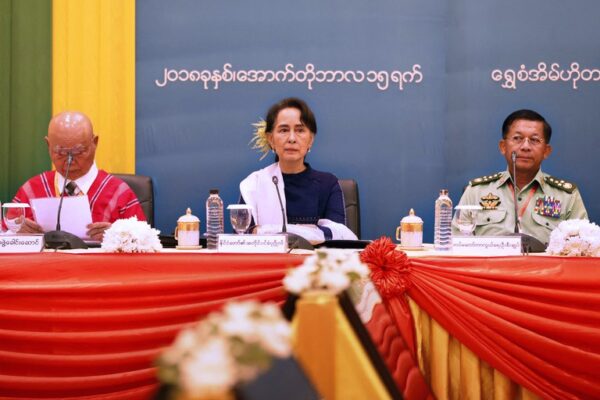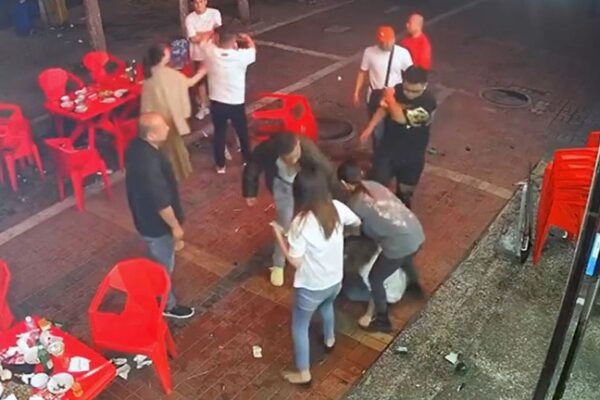
Myanmar’s junta met jailed NLD chief Suu Kyi twice to discuss peace
Myanmar’s junta has met at least twice with Aung San Suu Kyi, the jailed head of the deposed National League for Democracy, to enlist her help in peace negotiations with the armed resistance, only to be rebuffed by the former state counselor, Radio Free Asia has learned. Suu Kyi was visited on May 27 and June 4 in Naypyidaw Prison by three military officers – Lieutenant Gen. So Htut, the junta’s home affairs minister, Lieutenant Gen. Yar Pyae, who has led the military’s negotiation teams for peace talks with ethnic rebel groups, and retired Lieutenant Gen. Khin Zaw Oo, a source in the capital with close connections to the facility told RFA Burmese on Monday. “As much as we can confirm, the generals met her two times,” said the source, who spoke on condition of anonymity because they were not authorized to speak with the media. “We heard that the generals urged her to help the junta in its peacemaking process amid the current political situation and help stop the violence,” he said. “We’ve heard that [Aung San Suu Kyi] did not respond.” The junta has been embroiled in a protracted conflict with Myanmar’s increasingly formidable armed resistance groups and ethnic armed organizations since the military detained Aung San Suu Kyi and other top leaders of the NLD in a Feb. 1, 2021, coup d’etat. Junta courts found the 78-year-old Suu Kyi guilty of corruption charges and the violation of election and state secrets laws in December 2022. She faces a total of 33 years in jail for 19 cases, and is being held in solitary confinement in Naypyidaw. Suu Kyi’s supporters say the charges were politically motivated. The source in Naypyidaw told RFA that while the three generals may have met with Suu Kyi in prison more than twice, they hadn’t been able to confirm the visits. The junta has not made any official announcement about the meetings and RFA has been unable to independently confirm that they took place. Sources close to Suu Kyi’s legal team, including within the NLD, said that they were unaware of the meetings. Attempts by RFA to contact Naing Win, the junta’s deputy director general of the Department of Prisons, went unanswered Monday. Sources told RFA that Ottama Thara, the Buddhist abbot of Thabarwa Sanctuary in Thanlyin township, a port city located across the Bago River from the commercial capital Yangon, met with senior NLD party patron Thura Tin Oo on June 8 and advised that Suu Kyi should “retire from politics and participate in peacemaking efforts.” The monk, who reportedly met several times with top military leaders in Naypyidaw before the meeting with Thura Tin Oo, said that the junta generals hope that by doing so, Suu Kyi can facilitate an end to the country’s political deadlock. Suu Kyi ‘vital’ to Myanmar politics RFA spoke with NLD Central Working Committee member Kyaw Htwe, who said the party had heard that the generals met with Suu Kyi in prison, but couldn’t confirm the visit. “In Myanmar’s political world, the role of Daw Aung San Suu Kyi is vital,” he said, using an honorific to refer to the veteran politician and party chief. “There will never be practical political change without her. Meeting with her and holding discussions is very important.” Kyaw Htwe said that the military had violated Myanmar’s constitution by seizing power and is “entirely responsible” for the country’s current problems. “Only after all political prisoners, including State Counsellor Aung San Suu Kyi, are freed will the path to a resolution be implemented,” he said. Myanmar’s detained civilian leader San Suu Kyi, presides at a meeting in Naypyidaw with then military chief Senior Gen. Min Aung Hlaing and chairman of the Karen National Union Gen. Saw Mutu Say Poe to commemorate the third anniversary of signing of Myanmar’s Nationwide Ceasefire Agreement on Oct. 15, 2018. Credit: Myanmar State Counselor Office via AFP Nay Phone Latt, the spokesman for Myanmar’s shadow National Unity Government, said he had been unable to confirm the generals’ visits to Suu Kyi, adding that “it is too early for us to comment.” RFA contacted Thein Tun Oo, the head of the Thayninga Institute of Strategic Studies, a pro-military think tank founded by retired military officers in Naypyidaw, who said he was “surprised to hear that the generals visited her in prison.” “Some may think the generals met her as the [armed resistance] has become stronger,” he said. “But in my opinion, it’s almost impossible that the generals actually went to meet her … That may be the reason why it has not been publicly announced.” Violence ‘cannot be left unaddressed’ Than Soe Naing, a political analyst, told RFA that enlisting Suu Kyi to lead a peacemaking process between the junta and the armed resistance would “contradict her position and her beliefs.” “I believe that she will never accept such an offer from the junta because the violence … happening in Myanmar is the direct consequence of the military junta’s seizure of power,” he said. “Their offer to restrict her from the political arena and only allow her to participate in the peacemaking process may sound appealing, but it is complete nonsense as they did not discuss the political problems or the violence happening in the country.” Than Soe Naing said he could only envision Suu Kyi accepting such an offer “if the junta admits wrongdoing with the coup and reinstates the results of the 2020 election,” which saw the NLD secure victory in a landslide. The junta has since accused the NLD of election fraud, but has yet to provide evidence of its claims. “Additionally, the violence and crimes that the junta has committed against the people during the two years of the coup has to be discussed – it cannot be left unaddressed,” he said. “That’s why I believe that the junta’s offer, despite its sugar-coated words, is very cowardly and cunning. I don’t think Daw Aung San Suu Kyi will accept such an offer.” Since…



